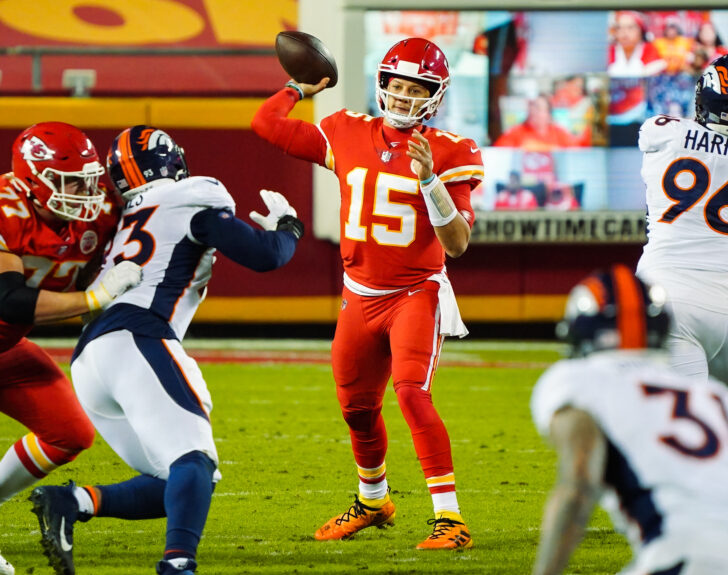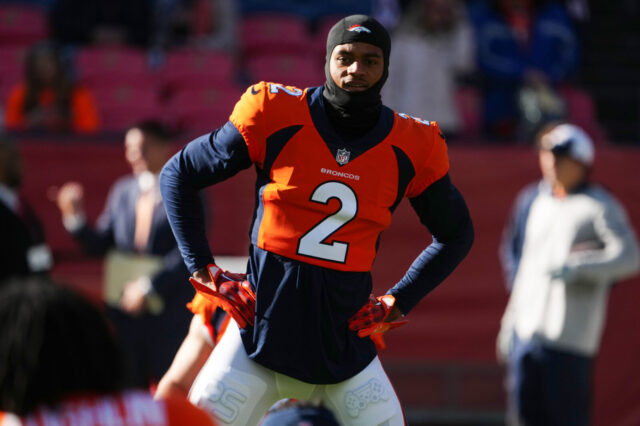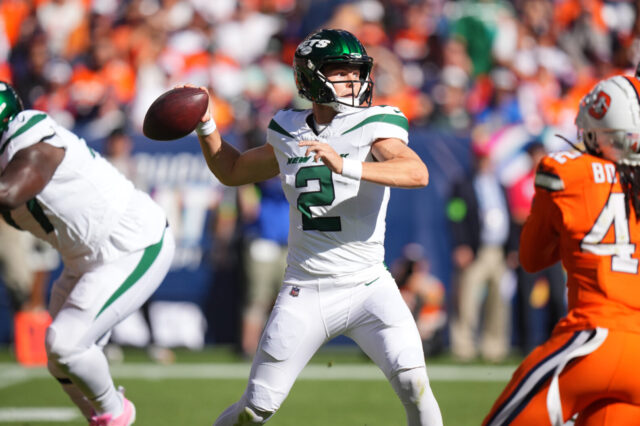In yet another highly consequential week for the AFC West, we saw the Kansas City Chiefs whoop the Denver Broncos, the Los Angeles Chargers get back on track against the Cincinnati Bengals, and the Las Vegas Raiders resume their collapse.
What was the fallout of these results and how do the Broncos compare to the rest of their divisional foes?
1. Kansas City Chiefs
It’s not very surprising that the Chiefs hold the best team in the division as we enter December. What is surprising, however, is how they’re doing it.
The offense remains fairly lackluster. That’s not to say it’s a bad offense, but it’s also very far from looking like the offenses of Kansas City’s past. There was some hope that the bye week would provide Andy Reid with a golden opportunity to remedy the offense’s ailments, but after Mahomes turned in his worst performance of his career (in terms of passer rating), and the offense generated just 13 points against the Broncos, it’s safe to say that the offensive woes remain.
The defense, on the other hand, is a very different story. After looking like the historically bad unit through the first several weeks of the season, they have pulled a complete 180. Since Week 9, the Chiefs rank third in expected points added (EPA) per play allowed and EPA per dropback allowed.
Relying on defense is still a dubious strategy in the modern NFL, but it’s a strategy that has been able to buy them time while they sort the offensive struggles out.
2. Los Angeles Chargers
The chasm between the Chiefs in the division as the Chargers feel much closer to the Broncos, in terms of overall quality.
Their win over the playoff-contending Bengals was very promising, as it allowed the Chargers to exorcise some mental demons, primarily their ability to choke games away. After opening up a suffocating 24-0 lead, Los Angeles found themselves up just 24-13 a mere seven-and-a-half minutes later, with the first half winding down. Then, halfway through the third quarter found themselves up just 24-22.
Fortunately for the Bolts, Joe Mixon made a costly fumble, which Tevaughn Campbell scooped up and returned for a touchdown. That play shifted the momentum and the Chargers never looked back.
Two promising observations that all 17 Chargers fans should take from this game are the evolutions of Joe Lombardi and their pass rush.
Lombardi has been struggling all season long to take advantage of Justin Herbert’s unique and elite skillset, by refusing to fire down the ball down the field on a limited basis. That changed this week, as Herbert’s average depth of target on first and second down was three yards higher against the Bengals than it was the rest of the season. Not only does this take advantage of Herbert’s best strengths, but it also utilizes Mike Williams’, Josh Palmer’s and Jalen Guyton’s best traits, allowing Los Angeles to drop a 40-point bomb on a solid Cincinnati defense.
Meanwhile, the pass rush was able to consistently get after Joe Burrow by incorporating some new pressure packages. One could easily credit the improved pass rush to the fact that the Bengals were starting two backups on the offensive line, but the Broncos didn’t seem to struggle with tackles No. 4 and No. 5 playing against the Chargers. Plus, the Chargers were without Joey Bosa for much of the game, leveling the playing field to some extent.
Having your quarterback and pass-rushers playing their best football in December is a great sign, but with these bipolar Chargers, we’ll have to see these improvements carry over into next week before buying in.
3. Denver Broncos
The Broncos’ Sunday night matchup with the Chiefs felt a lot like big brother putting little brother back in their place.
That’s likely a comparison which Broncos Country will prickle at, but it’s accurate. When you lose 12 straight in a rivalry series, you kinda become ‘little brother’ until you can prove otherwise.
The most frustrating part of the battle was that Fangio’s impressive defensive game-planning was once again wasted by an anemic offense. During the course of his Broncos tenure, Fangio has held the Chiefs to 22 points per game — a feat made even more impressive when you consider how much more unstoppable Kansas City’s offenses of the past were — while the Broncos offense is averaging just 10 points per game.
That’s sobering, to say the least, but as somber as this past week has been for Broncos Country, there are positives that one could take from this game.
For starters, everything was stacked against the Broncos. John Elway only won one December game in Arrowhead over the course of his entire career and Teddy Bridgewater is, well, not Elway. Plus they had to deal with Andy Reid coming off a bye week, their offense and special teams surrendering nine points to the Chiefs, and their starting quarterback playing his worst game of the season.
Yet still, the Broncos only lost by 13 points, and again, nine of those came from offensive or special teams gaffes. The Broncos also don’t have a matchup that difficult the rest of the way, as their next matchup with the Chiefs will be at home, and none of their other opponents are of the same caliber as Kansas City.
If Denver can have almost everything go wrong, and only lose by 13 points in their toughest remaining game on the schedule, there is still hope for a miraculous run into the playoffs.
4. Las Vegas Raiders
Last week, we discussed how that despite seemingly being in the middle of a collapse, that the Raiders were coming off an impressive Thanksgiving win over the Dallas Cowboys, which was enough to keep them out of last place. However, we also said we would have to see another convincing performance out of the offense.
Flash forward a week, and the Raiders are coming off an embarrassing loss to the Washington Football Team, in which they only scored 15 points.
The loss of Henry Ruggs III and Darren Waller are certainly large pieces of the puzzle as to why the Raiders offense has gone so stagnant, but unfortunately for Vegas, their problems are much larger than that.
They’ve gotten far more production out of DeSean Jackson than one would have reasonably expected — though he certainly isn’t Ruggs still — and Waller spent more time on the field during this cold stretch than off.
The offensive line is the biggest problem, but that’s been a hazard all season. The new flaw that has cropped up, and that has helped spur this offensive slump, has been Derek Carr’s regression as a quarterback.
Throughout the first half of this season, many national analysts waxed poetic — and rightfully so — about how it appeared that Carr had finally figured it out. He had found his groove, and this time it won’t be followed by a cold stretch that makes the football cognoscenti once again view Carr as a streaky, unreliable, mid-tier quarterback.
However, ever since Ruggs left the field, Carr has regressed by quite a bit. Not only has his aggression — which had been a large reason for his developmental leap — declined, but he’s also missing open throws. Two misses on throws to open receivers against Washington (one on a two-point conversion, and the other on a deep shot to Zay Jones) cost Vegas the game.
Carr isn’t the same player he was earlier in the year, and it’s tough to imagine the Raiders recovering as a result.



